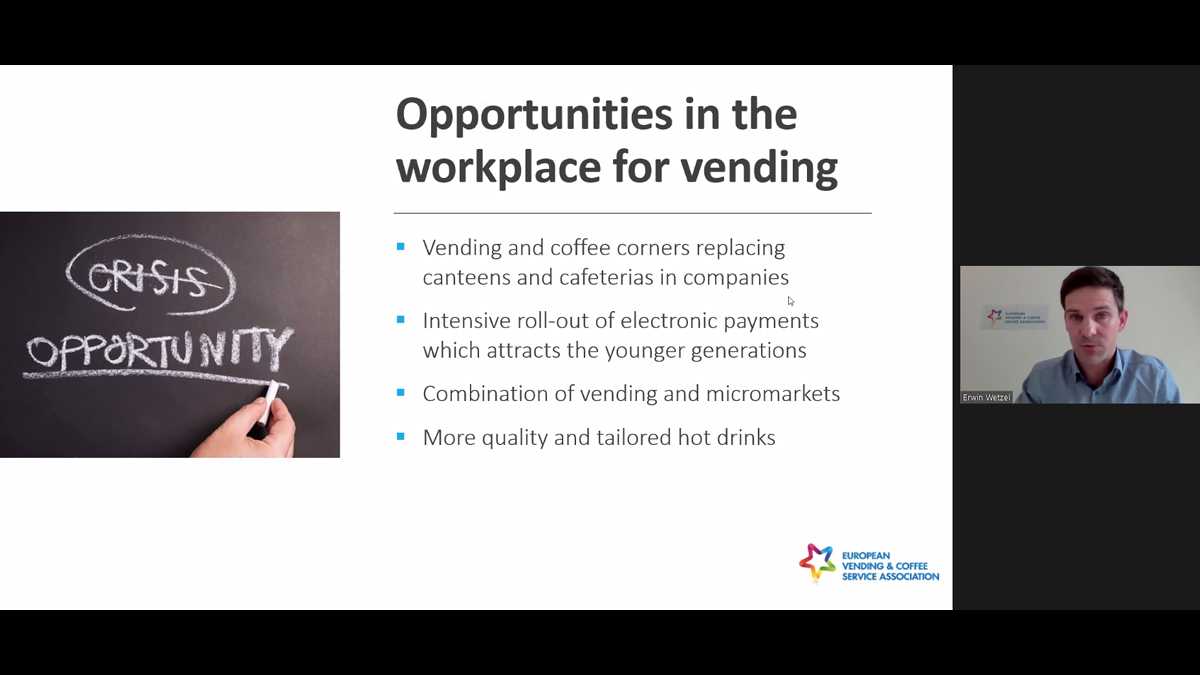MILAN – On 29 September the EVA, the European Vending and Coffee Service Association, hosted a webinar with almost 100 participants to discuss and better understand how the Covid-19 crisis has and will affect the working environment in many companies, and importantly how vending operators can meet the new expectations of the consumers in the workplace.
Moderated by the EVA Director General Erwin Wetzel, participants heard from Aurélie Oberti (Lyreco), Fabien Claus (CBC Bank) and Jan Marck Vrijlandt (Selecta) on their experiences of the change in working habits since the restrictions related to Covid-19 were introduced, and what challenges and opportunities could now exist for vending companies.
While it was clear that employees working from home requires some significant adaptations, particularly from larger companies unable to modify offices to ensure social distancing, Aurélie Oberti suggested that the current crisis has not introduced completely new trends, but rather accelerated (drastically) existing workplace trends such as flexi working, remote working and digitalisation. Companies are still renewing office leases but typically on a shorter time basis as they see how the situation unfolds in the medium term, and she also expects an increase in co-working spaces – not just in the larger cities but in regional towns so that smaller groups of workers can meet in person for quick productive meetings without the inconvenience of commuting.
Fabien Claus explained that CBC Bank had already implemented home working possibilities for its office-based staff for the last years as the company decentralised its Headquarters outside of Brussels. However, a reinvention of working habits changed overnight for their branch-based employees and the company now operates a hybrid model of working whereby staff are physically present for 2 days a week in the office, and teams are split. This is something he expects could continue in the future, but other aspects like training for staff and how to offer benefits such as coffee to workers at home must also be considered.
Jan Marck Vrijlandt outlined the experience of Selecta and what opportunities could present themselves for vending. As coming to the office becomes less frequent, employees will look more for an ‘experience’ at the workplace that they can’t get from their homes.
This means that employees could be prepared to spend more and look for more premium vending and coffee provisions in the office. In his opinion, the model of large canteens serving many employees at the same time is finished, and therefore could provide some interesting prospects for the self-serve industry. Cashless solutions, micromarkets (and smaller smart fridges), telemetry, and the possibility to offer the coffee-at-work to workers at home could prove very interesting for vending companies.
All the participants agreed that for the longer term they don’t expect employees to fully work from home 5 days a week, nor fully work every day at the office, but most companies will probably settle on a hybrid policy of 2-3 days per week in the office, perhaps with rotating teams.
A Q&A session concluded the EVA webinar, with many varied questions posed to the panellists.


















